Breeze through the Bible in just 15 days with a plan that promises to unveil centuries of wisdom, leaving you pondering life's biggest questions.
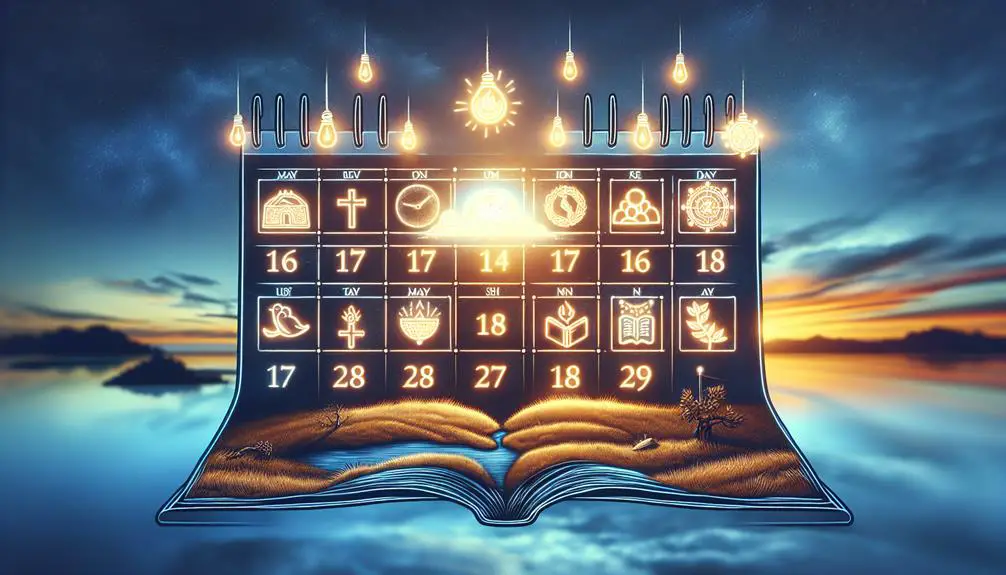
Read the Bible in 15 Days Reading Plan
In a world where you can binge-watch an entire TV series in a weekend, the idea of consuming the Bible in just 15 days may seem like a telegram from the past, yet it's a challenge that could transform your understanding of this ancient text.
You'll start from the very beginning, journey through the narratives, laws, poetry, and prophecies, and end with the apocalyptic revelations. However, this isn't just about speed; it's an invitation to immerse yourself in a spiritual odyssey.
As you ponder the feasibility of this task, consider the layers of wisdom and insight you might uncover in such a concentrated exploration.
Key Takeaways
- The plan offers a comprehensive journey through both Old and New Testaments, highlighting key biblical themes and stories.
- It explores themes such as suffering, faith's resilience, righteousness, and perseverance, reflecting on their relevance today.
- This reading plan includes insights into leadership, community, and the application of Christian doctrine in daily life.
- Concluding with reflections on faith, hope, and love, it aims to strengthen understanding and application of the Gospel.
Day 1: Genesis to Exodus

Embarking on the journey from Genesis to Exodus, you'll traverse the foundational narratives that set the stage for the entire biblical saga. Genesis opens with the Creation story, a profound narrative that not only introduces the universe's origin but also sets a precedent for themes of order, purpose, and relationship between the divine and the mundane. Within this cosmic framework, Eden's garden emerges as a focal point, symbolizing both the potential for human flourishing and the pitfalls of disobedience.
Analyzing the Creation story, you'll notice a structured unfolding of the cosmos, from formlessness to a habitable world, culminating in the creation of humankind. This orderly progression underscores a universe crafted with intention and care, challenging you to ponder the divine purpose behind your existence and the broader cosmos. Eden's garden, with its boundaries and the tree of knowledge, introduces the concept of choice, highlighting the inherent tension between divine will and human autonomy. This narrative thread not only explores the consequences of actions but also sets the stage for themes of redemption and covenant that recur throughout the biblical text.
As you move from the idyllic yet complex beginnings in Genesis to the trials and tribulations in Exodus, you're invited to reflect on the evolution of divine-human relations. The transition from the intimate interactions in Eden's garden to the broader national narrative of Exodus reveals a shift from personal disobedience to collective destiny. This journey through Genesis to Exodus thus offers a rich tapestry of theological insights, inviting deep contemplation on the nature of faith, obedience, and redemption.
Day 2: Leviticus to Numbers

As you progress to Day 2 of your reading plan, you encounter the complex Levitical laws and the Israelites' arduous journey to the Promised Land, as narrated in Leviticus and Numbers.
The detailed exposition of Levitical laws not only reflects the socio-religious fabric of ancient Israelite society but also sets the stage for understanding purity and atonement in a communal context.
Furthermore, the census in Numbers is pivotal, illustrating the organizational structure and preparedness of the Israelites for their impending challenges, thereby underscoring themes of obedience, faith, and divine providence.
Levitical Laws Explained
Diving into the heart of Levitical laws, you'll discover a complex system designed to govern the moral, ritual, and societal aspects of ancient Israelite life. At the forefront are priestly garments and sacrificial rituals, emblematic of the Israelites' devotion and adherence to divine commandments.
These garments, meticulously detailed in the scriptures, symbolize purity and set the priests apart, embodying their sacred role in mediating between the divine and the mundane. Similarly, sacrificial rituals, central to Levitical legislation, articulate a theology of atonement, worship, and covenant renewal. They underscore the importance of obedience, repentance, and the sanctity of the community's relationship with God.
This intricate framework not only structured the religious life of ancient Israel but also offered a tangible expression of their covenantal bond with the divine.
Journey to Promised Land
Moving from an exploration of Levitical laws, our journey now takes us through Leviticus to Numbers, where narratives shift towards the Israelites' preparations and challenges en route to the Promised Land. This segment significantly focuses on the Wilderness wanderings and the pivotal Canaan espionage, marking a transition from divine instructions to their practical application and the resultant consequences of faith and disobedience.
Aspect |
Leviticus |
Numbers |
|---|---|---|
Focus |
Laws and rituals |
Journey and challenges |
Key Event |
Sanctuary service |
Spying on Canaan |
Outcome |
Holiness code |
Wilderness wanderings |
Divine Guidance |
Priestly instructions |
Navigation & battles |
This progression underscores the Israelites' fluctuating faith and God's consistent guidance, framing their arduous trek with profound theological and moral lessons.
Numbers' Census Significance
The initial census in Numbers not only provides a numerical account of the Israelite community but also serves as a foundational element for understanding their organizational structure and readiness for the journey ahead.
This enumeration isn't merely a headcount; it's a strategic assessment underpinned by divine organization, ensuring each tribe's role and responsibilities are clearly defined.
The population dynamics revealed through the census underscore the importance of order and preparedness in facing the challenges ahead. It reflects a methodical approach to mobilization, where numbers translate into strength and strategy.
This divine orchestration of the census highlights the meticulous care in preparing the Israelites not just physically, but spiritually for the path that lay before them, emphasizing the interconnectedness of faith, leadership, and community cohesion.
Day 3: Deuteronomy to Joshua

Transitioning from Deuteronomy to Joshua, you'll observe a shift from the delivery of the law to its application in the conquest of the Promised Land. Deuteronomy, the final book of the Pentateuch, reiterates the Mosaic covenant, emphasizing obedience and faithfulness to God's commands as the Israelites prepare to enter Canaan. This book serves as a bridge, recounting the laws given to the Israelites and preparing them for the challenges ahead. The narrative underscores the importance of adhering to the covenant to secure God's blessings in the land they're about to inherit.
Joshua's leadership marks a critical phase in the Israelite's journey, transitioning from the wilderness wanderings to establishing a foothold in Canaan. Under Joshua's guidance, the focus shifts from receiving the law to actively applying it in the context of conquest and settlement. The book of Joshua narrates the fulfillment of God's promises to Abraham, Isaac, and Jacob, detailing the military campaigns and the division of the land among the twelve tribes of Israel. Joshua's role as a leader is pivotal, embodying faith and obedience to God's commands, which are key themes carried over from Deuteronomy.
The transition from Deuteronomy to Joshua illustrates the movement from covenant establishment to covenant fulfillment. This progression underscores the continuity of God's plan for His people, from the promise of the land to its actual possession. It reflects a broader theme in the biblical narrative of faith, obedience, and the realization of God's promises, encapsulated in the leadership and legacy of figures like Moses and Joshua.
Day 4: Judges to 1 Samuel

Embarking upon the journey from Judges to 1 Samuel, you'll delve into a period marked by Israel's cyclical pattern of apostasy, oppression, repentance, and deliverance, reflecting the nation's struggle to consistently live out the covenantal faith in the absence of centralized leadership. This era, devoid of a monarchical system, showcases the emergence of charismatic leaders known as Judges, who were instrumental in guiding the Israelites through times of crisis. Among these narratives, the story of Samson stands out, not only for his extraordinary feats of strength but also for his enigmatic riddles, which serve as a profound metaphor for the elusive nature of wisdom and power in this tumultuous period.
Transitioning to the book of 1 Samuel, the focus shifts to the establishment of a more structured form of governance under the stewardship of prophets and priests. Here, Eli's priesthood represents a pivotal moment in Israel's history, bridging the gap between the tumult of the Judges and the dawn of monarchy. Eli's tenure, however, is also emblematic of the challenges inherent in maintaining spiritual and moral integrity, as his sons' corruption underscores the perils of nepotism and the erosion of ethical standards.
This segment of your reading plan illuminates the complexities of leadership, faith, and governance in ancient Israel. Through the narratives of Samson's riddles and Eli's priesthood, you gain insights into the multifaceted challenges that faced a nation in transition, striving for stability and identity amidst internal and external pressures. This exploration not only enhances your understanding of Israel's historical and religious landscape but also offers timeless lessons on leadership and morality.
Day 5: 2 Samuel to 2 Kings

You'll find that the narratives from 2 Samuel to 2 Kings provide a comprehensive exploration of leadership dynamics within ancient Israel, focusing on the reign of David, Solomon's tenure, and the subsequent division of the kingdom.
These books highlight the complexities of governance, wisdom, and the repercussions of leadership decisions on a nation's fate. This segment allows you to understand the pivotal moments that shaped the historical and spiritual landscape of Israel, providing insights into the challenges and successes of its leaders.
David's Reign Explored
Delving into Day 5 of your Bible reading plan, David's reign unfolds as a pivotal era, spanning from 2 Samuel to 2 Kings, marked by profound leadership, complex challenges, and divine interactions. This period showcases:
- The iconic Goliath battle, symbolizing David's faith and valor.
- The rich Psalm compositions, reflecting deep spiritual introspection and worship.
- Political and family turmoil, revealing the complexity of David's leadership and personal life.
Analyzing David's reign, we observe a multifaceted leader: a warrior inspired by faith, a poet expressing the human condition, and a king navigating the intricacies of governance and personal dilemmas. His story is a compelling narrative of triumph, repentance, and the human endeavor to align with divine will, offering invaluable insights into leadership, faith, and the complexities of human nature.
Solomon's Wisdom Highlighted
Transitioning from David's complex reign, we now turn our focus to his son, Solomon, whose wisdom and governance mark a distinct chapter in biblical history. Solomon's reign is perhaps best symbolized by two notable events: the visit from Queen Sheba and the construction of the Temple in Jerusalem.
The encounter with Queen Sheba underscores Solomon's international reputation for wisdom and wealth, an aspect that solidifies his political and economic influence in the region. Meanwhile, the Temple's construction not only exemplifies Solomon's dedication to Yahweh but also represents a pinnacle of Israelite religious life.
These events, emblematic of Solomon's wisdom, highlight a period of unparalleled prosperity and cultural development, setting a benchmark for leadership that intertwines spiritual devotion with political acumen.
Kingdom Division Explicated
As we explore the narrative from 2 Samuel to 2 Kings, it becomes evident that the division of the kingdom marks a pivotal moment in Israelite history, reshaping its political and religious landscape. This schism had profound implications, not least on:
- Temple significance: The division altered the centrality of worship, impacting the spiritual unity and identity of the Israelites.
- Prophetic implications: Prophets played crucial roles, interpreting the division as a divine response to unfaithfulness, thereby influencing future theological perspectives.
- Socio-political dynamics: The split led to distinct northern and southern kingdoms, each with unique political challenges and religious practices.
This period underscored the complex interplay between faith, governance, and identity, shaping the trajectory of Israelite history.
Day 6: 1 Chronicles to Nehemiah

On Day 6, you'll explore the historical and theological narratives from 1 Chronicles to Nehemiah, highlighting the restoration and rebuilding themes crucial to understanding Israel's identity. Starting with the Chronicle genealogies, these lists serve more than just a historical record; they're a theological statement about continuity, identity, and the right to land and temple. They underscore the importance of community and the unbroken line that connects the present with the past, reinforcing the idea that despite exile and dispersion, the covenant community remains intact.
Moving forward, Nehemiah's leadership marks a pivotal moment in the narrative. His role isn't just that of a political leader; he embodies the spiritual and social reawakening of the people. Nehemiah's tireless efforts in rebuilding Jerusalem's walls symbolize much more than physical reconstruction; they represent the reestablishment of faith, law, and order within the community. This period of restoration under Nehemiah is critical, as it sets the stage for a renewed covenant relationship between God and His people.
Both Chronicles and Nehemiah, therefore, offer profound insights into the themes of restoration, renewal, and identity. They highlight the resilience of faith and community against adversity and the central role of leadership in guiding and sustaining this renewal process. As you delve into these books, consider how the themes of rebuilding and restoration resonate not just in the context of Israel's history but in personal and communal faith journeys today.
Day 7: Esther to Psalms
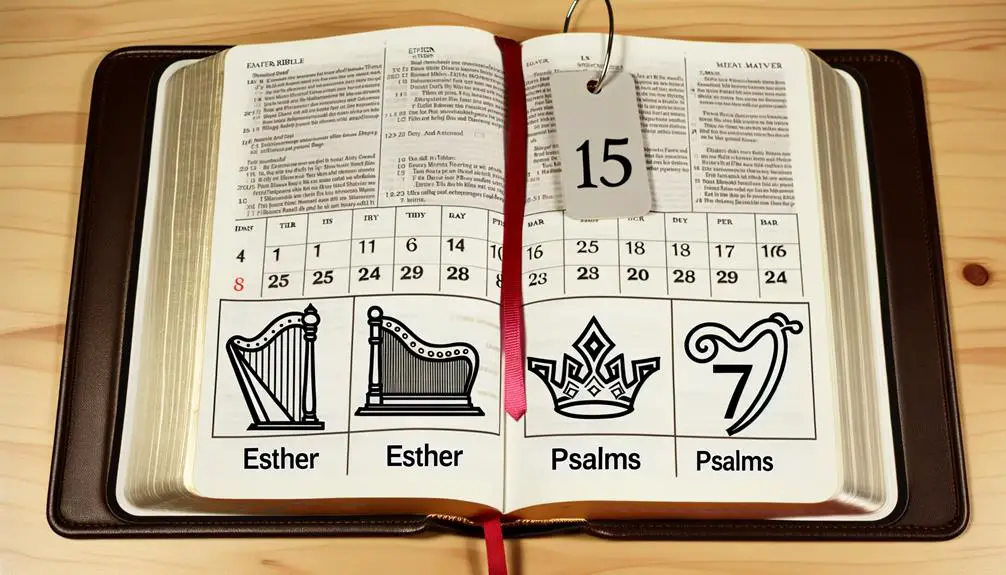
On Day 7, you'll explore themes of bravery, steadfastness, and devotion that define Esther's courageous act. Her narrative showcases the impact of individual bravery in the face of systemic adversity, highlighting a pivotal moment in Jewish history.
Job's enduring faith is another key aspect to be explored. His story offers a profound exploration of faith amidst suffering, delving into the complexities of human existence and divine providence.
The Psalms, as a worship anthology, provide a diverse collection of prayers and hymns that encapsulate the breadth of human emotion and divine worship. These sacred songs offer solace, praise, lament, and thanksgiving, reflecting the multifaceted nature of the human experience in relation to the divine.
Esther's Courageous Act
Esther's courageous act, marked by her decision to approach the king unsummoned, reveals a pivotal moment of faith and determination within the narrative. Her royal beauty and feast strategies played critical roles in her success, showcasing her wisdom and understanding of court politics. This moment isn't just about bravery; it's a calculated move within a dangerous political landscape.
- Royal Beauty: Esther utilized her appearance as a strategic asset, understanding its influence over the king.
- Feast Strategies: Her choice to invite the king and Haman to two feasts highlights her tactical patience and timing.
- Courageous Faith: Despite the risk of death, her faith in a greater plan empowered her actions.
Esther's story is a compelling study in the power of individual agency within a divine framework.
Job's Enduring Faith
Just as Esther's story illustrates the power of individual agency within a divine framework, Job's enduring faith amidst suffering highlights a profound exploration of righteousness and perseverance. You'll see how Job's narrative delves into the complexities of Suffering's purpose and Faith's resilience, challenging you to consider the depth of your own beliefs in the face of adversity.
Theme |
Insights |
|---|---|
Suffering's Purpose |
Explores why the righteous may endure hardship |
Faith's Resilience |
Shows steadfast belief despite life's storms |
Righteousness |
Questions the relationship with divine justice |
Perseverance |
Encourages enduring faith without understanding |
Divine Framework |
Intersects human agency with divine will |
Job's story teaches that faith isn't merely a feeling but a choice, especially when the reason behind suffering remains a mystery.
Psalms: Worship Anthology
Transitioning from the story of Esther's agency and Job's unwavering faith, the Psalms offer an anthology of worship that encapsulates the full spectrum of human emotion in its relation to the divine. This collection, rich in poetry and song, profoundly influences both personal spirituality and communal worship practices.
- Musical Influence: The Psalms have shaped the development of Christian and Jewish music, informing hymns, chants, and contemporary worship songs.
- Emotional Range: From deep despair to exuberant joy, the Psalms articulate the breadth of human experience with God.
- Modern Applications: Their timeless wisdom continues to guide prayer, meditation, and moral reflection in diverse contexts.
Analyzing the Psalms reveals their enduring relevance, offering insights into the human condition and the nature of divine engagement.
Day 8: Proverbs to Isaiah

Embarking on Day 8, you'll navigate the wisdom-laden passages of Proverbs to the profound prophecies of Isaiah, examining their theological significance and historical context. Proverbs, quintessential wisdom literature, offers practical guidance for living a life reflective of divine wisdom. Its aphorisms and didactic poems delve into themes of morality, discipline, and the fear of the Lord as the foundation of wisdom. This book's compilation from various authors, including King Solomon, showcases the universal pursuit of wisdom across generations.
Transitioning from Proverbs, you encounter Ecclesiastes and the Song of Solomon. Ecclesiastes presents a philosophical exploration of life's meaning, emphasizing the temporality of worldly pursuits and the importance of fearing God. In contrast, the Song of Solomon celebrates divine love, often interpreted allegorically as the love between God and His people.
Your journey culminates with Isaiah, a cornerstone of prophetic literature. This book is renowned for its Messianic prophecies, foretelling the coming of the Messiah who'd bring salvation to both Jews and Gentiles. Isaiah's prophecies are pivotal, not only for their predictive elements but for their emphasis on social justice, righteousness, and the sovereignty of God. The book's historical context, set against the backdrop of Assyrian aggression and the threat to Jerusalem, enriches your understanding of these prophecies' immediacy and their enduring hope.
Day 8's reading plan illuminates the multifaceted nature of biblical text, from the wisdom of daily living to the transformative promise of future redemption. This journey through Proverbs to Isaiah offers a deep dive into the heart of biblical wisdom and prophecy.
Day 9: Jeremiah to Lamentations

On Day 9, you'll explore Jeremiah's prophetic messages, which are pivotal in understanding the complexities of divine communication and human response.
The themes in Lamentations provide a profound insight into the nature of sorrow and the process of grieving, marking a significant shift in literary style from prophecy to poetry.
This transition underscores the versatility of biblical text, illustrating how different genres can offer varied perspectives on faith and human experience.
Jeremiah's Prophetic Messages
Jeremiah's prophetic messages, delivered during one of the most tumultuous periods in Judah's history, serve as a profound reflection on the nation's moral and spiritual decline. His narratives and visions underscore a pivotal moment, introducing the concept of a New Covenant, aimed at transforming the heart and spirit of the people. Yet, Jeremiah's path was fraught with hardship, including his imprisonment, underscoring the resistance to his divine message.
- New Covenant: A revolutionary idea promising a personal, internalized relationship with God.
- Jeremiah's Imprisonment: Symbolizing the prophet's physical and ideological struggles against the prevailing order.
- Moral and Spiritual Decline: A central theme, highlighting the consequences of turning away from divine guidance.
Jeremiah's words resonate with timeless insights into human nature and divine expectation, offering a critical lens through which to view societal and individual conduct.
Themes in Lamentations
Transitioning from the prophetic declarations in Jeremiah to the poignant expressions of grief in Lamentations reveals a profound shift in biblical narrative, focusing on the aftermath of Jerusalem's fall and the deep sorrow that ensued.
Within Lamentations, you'll encounter sorrowful reflections that serve not only as a testament to the profound grief experienced by the Jewish people but also as a critical examination of their collective sins and the consequences thereof.
Yet, amidst this lamentation, themes of hopeful restoration emerge subtly, suggesting a divine willingness to renew and rebuild should the people return to righteousness. This duality encapsulates the essence of Lamentations, intertwining despair with a thread of hope, urging a reflection on loss, repentance, and ultimately, redemption.
Transitioning Prophets to Poetry
Moving from the prophetic narratives found in Jeremiah to the poetic lamentations of its namesake book offers a unique lens through which to explore the shift from divine warnings to the expression of communal grief. This transition highlights:
- The use of poetic structure to convey deep emotional and spiritual turmoil
- Metaphorical language that enriches the text, providing layers of meaning
- The shift from individual prophecy to a collective lament, underscoring communal experiences of suffering and hope
Understanding this shift is crucial for grasping the full scope of biblical literature. It reflects the versatility of the biblical text in addressing human experiences through different literary forms, from the directness of prophetic declarations to the nuanced expressions found in poetry.
Day 10: Ezekiel to Daniel
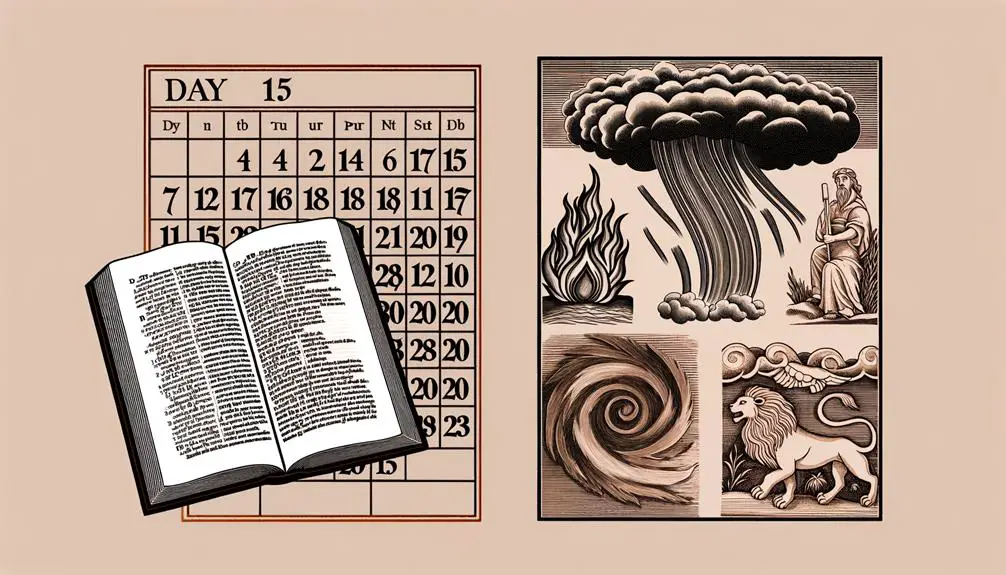
Today's reading takes you from the prophetic visions of Ezekiel to the apocalyptic revelations of Daniel, each book offering unique insights into God's plans for His people. As you delve into these texts, you'll encounter the complex interplay of judgment and redemption that characterizes the experience of the Israelites during and after their exile.
Ezekiel's Visions |
Daniel's Dreams |
|---|---|
Offer insights into God's judgment and hope for restoration. |
Unveil God's sovereignty and His plans for kingdoms of the world. |
Use symbolic actions and vivid imagery to convey messages. |
Include interpretations of dreams that predict future events. |
Highlight the role of individual responsibility and repentance. |
Emphasize faithfulness and divine intervention in times of trial. |
Ezekiel's visions are marked by their dramatic and symbolic nature, serving as divine messages to the Israelites. These visions, ranging from the valley of dry bones to the restoration of the temple, underscore the importance of repentance and the hope for renewal. On the other hand, Daniel's dreams reveal God's overarching sovereignty and control over historical events and kingdoms. His experiences, from interpreting the dreams of Nebuchadnezzar to his own visions of future empires, illustrate the power of faith and the certainty of God's victory over earthly powers.
As you engage with these texts, consider the ways in which Ezekiel's visions and Daniel's dreams provide a framework for understanding God's interaction with His people and the world. These prophetic books not only recount historical events but also offer timeless lessons on faith, judgment, and redemption.
Day 11: Hosea to Micah

After exploring the prophetic visions of Ezekiel and Daniel's apocalyptic revelations, you'll now encounter the poignant messages of Hosea to Micah, emphasizing the themes of love, justice, and divine retribution. This segment of your reading journey not only continues the exploration of the complexities of faith and obedience but also delves deeply into the personal and societal implications of abandoning covenantal relationships with God.
- Hosea's narrative, particularly Gomer's redemption, serves as a powerful metaphor for God's unwavering love and mercy towards Israel, despite their infidelity. This story exemplifies the depth of divine love, illustrating that it isn't merely an emotion but an enduring commitment to restoration and forgiveness.
- The vineyard metaphor used by both Isaiah and Micah offers rich imagery to contemplate. It symbolizes Israel as God's carefully tended garden, expected to yield justice and righteousness. Yet, the prophets lament the yield of bloodshed and cries of distress, encapsulating the profound disconnect between divine expectations and Israel's reality.
- Micah's famous dictum, 'What does the Lord require of you? To act justly and to love mercy and to walk humbly with your God' (Micah 6:8), distills the essence of the messages from Hosea to Micah. This encapsulation not only demands reflection on personal ethics but also calls for societal justice, mercy, and humility before the divine.
These books collectively challenge you to reflect on the nature of your relationship with God, emphasizing that true faith manifests in justice, mercy, and humility. Their timeless messages resonate deeply, urging a reevaluation of both personal and communal life in light of divine expectations.
Day 12: Nahum to Malachi
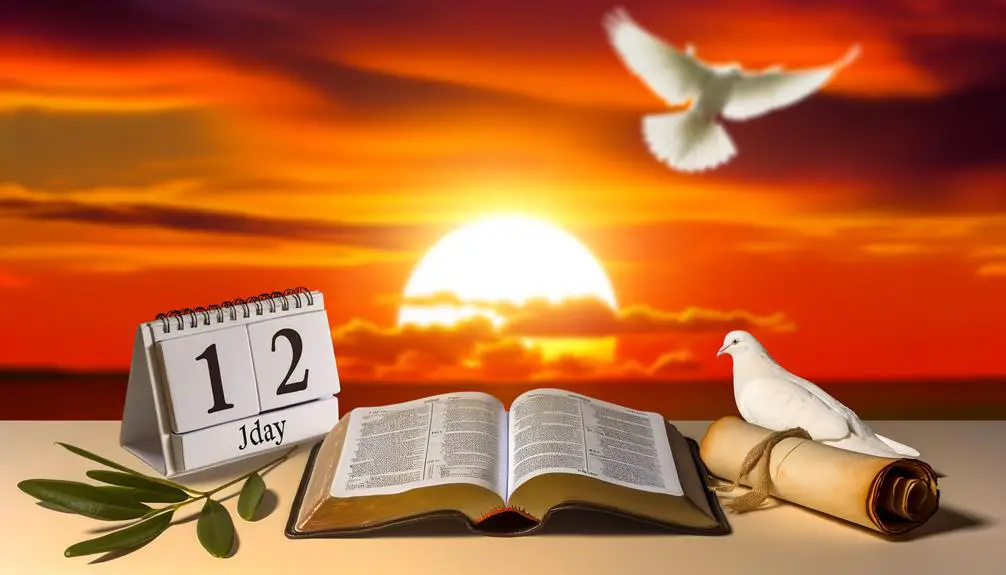
As you progress to the writings from Nahum to Malachi, you're confronted with a diverse tapestry of prophecy, ranging from declarations of divine judgement to promises of restoration and hope. In this journey, Nahum's prophecy stands out for its focus on the fall of Nineveh, serving as a potent reminder of the consequences of societal sin and the inevitability of divine justice. Through vivid imagery and poetic license, Nahum delineates the downfall of a city emblematic of cruelty and oppression, setting the stage for a broader reflection on the nature of retribution and redemption in the biblical narrative.
Transitioning from the specific to the general, the subsequent books build upon Nahum's themes, expanding the scope of prophecy to encompass not only judgement but also the promise of restoration for Israel. It's within this milieu that Malachi's messenger emerges, articulating a vision of hope amidst rebuke. Malachi, positioned at the close of the Old Testament, serves as a bridge between the prophetic warnings of the past and the anticipation of a new covenant. His discourse on the refinement and purification of God's people introduces a forward-looking perspective, hinting at a future where faithfulness is rewarded and covenantal relationships are renewed.
Throughout these writings, a pattern of divine fidelity juxtaposed against human fallibility is evident, offering a nuanced exploration of the dynamics between God and humanity. The prophetic voices from Nahum to Malachi, thus, not only recount historical events but also engage deeply with theological and moral questions that resonate beyond their immediate context, inviting reflection on justice, repentance, and the nature of divine-human interaction.
Day 13: Matthew to Acts

Embarking on Day 13, you delve into the New Testament, starting with the Gospel of Matthew and concluding with the Acts of the Apostles, which collectively inaugurate a transformative era in biblical history marked by the life, death, and resurrection of Jesus Christ and the early days of the Christian church. This segment offers a profound exploration into the teachings of Jesus, His miraculous deeds, and the foundational events that shaped the nascent church.
In this journey, you'll encounter:
- The parables of Jesus, rich in moral and theological lessons, which are pivotal for understanding His teachings on the Kingdom of Heaven.
- The Apostolic actions, reflecting the courage, faith, and challenges of the early disciples as they spread the gospel message.
- The Pentecost significance, marking the descent of the Holy Spirit and the birth of the church, a key event that empowered the apostles for their mission.
Analyzing these texts, you gain insights into the essence of Christian doctrine and ethics. The Gospel of Matthew presents Jesus as the fulfillment of Old Testament prophecies, emphasizing His role as the Messiah. Moving through to Acts, the narrative shifts to the Apostolic actions, detailing their endeavors to establish Christian communities amidst persecution. The event of Pentecost emerges as a pivotal moment, demonstrating the transformative power of the Holy Spirit in equipping the disciples for their mission.
This phase of your reading plan not only enriches your understanding of Christian origins but also offers timeless lessons on faith, resilience, and the impact of divine intervention in human affairs.
Day 14: Romans to Ephesians
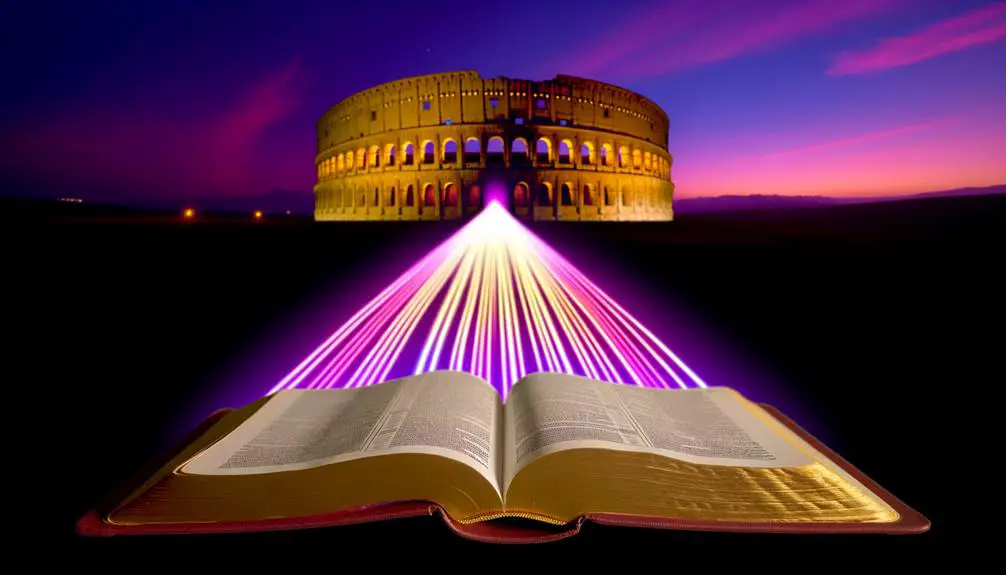
Continuing your biblical journey, Day 14 introduces you to the Epistles of Paul, starting with Romans and concluding with Ephesians, which collectively delve into the complexities of Christian theology and ethics. These letters not only showcase Paul's apostleship but also articulate the Grace doctrine, pivotal to understanding salvation and Christian living.
Book |
Theme |
Key Takeaways |
|---|---|---|
Romans |
Justification by Faith |
Explores the concept of salvation through faith, not works, highlighting the universality of sin and the necessity of grace. |
1 & 2 Corinthians |
Church Unity and Discipline |
Addresses issues within the Corinthian church, emphasizing the importance of unity, love, and moral purity. |
Galatians |
Freedom from the Law |
Argues against the necessity of following Jewish law for Gentile believers, reinforcing the doctrine of justification by faith alone. |
Ephesians |
The Church as the Body of Christ |
Focuses on the unity of believers in Christ, outlining ethical living and the spiritual warfare faced by Christians. |
Paul's letters are essential for their theological depth and practical advice. Romans, often considered the cornerstone of Christian doctrine, systematically explains human sinfulness, redemption through Christ, and the implications for personal and communal life. The subsequent letters to the Corinthians and Galatians address specific community issues, reaffirming key theological principles while offering guidance on church governance and moral conduct. Ephesians expands on these ideas, presenting the church as a unified body under Christ's headship, tasked with living out the gospel in a hostile world. By analyzing these texts, you'll gain a comprehensive understanding of early Christian thought and its application to modern faith practice.
Day 15: Philippians to Revelation
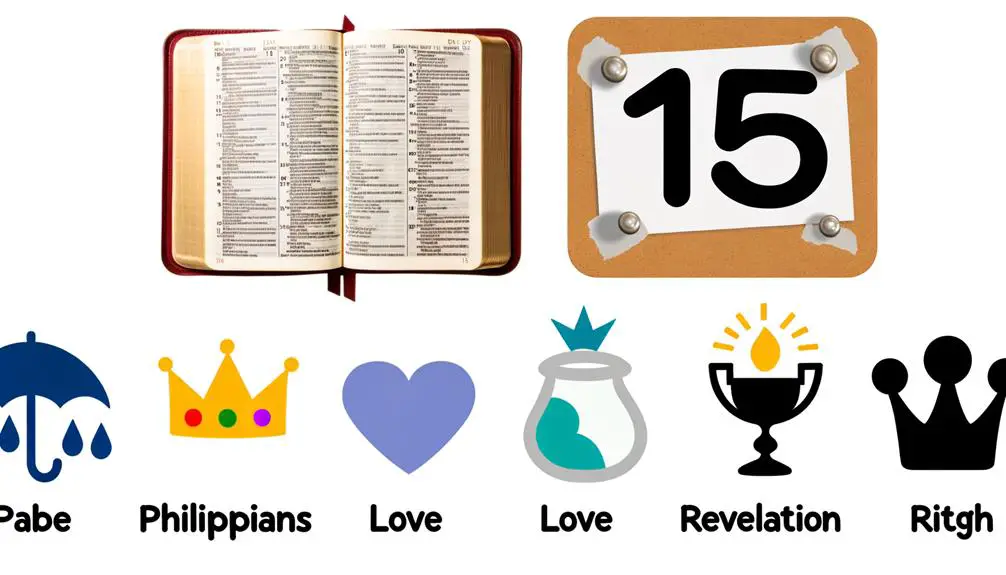
On Day 15, you'll explore the concluding portion of the New Testament, covering Philippians to Revelation, which encapsulates the essence of Christian perseverance, eschatology, and practical faith application. This final leg of your journey through the Bible in 15 days brings you to the heart of Paul's journey and the apocalyptic imagery of Revelation prophecy, offering a profound understanding of Christian doctrine and the hope that sustains believers.
In Philippians, you encounter Paul's intimate reflections on joy and contentment amidst suffering, emphasizing the power of Christ within. The subsequent books, including Colossians, Thessalonians, Timothy, Titus, and Philemon, further delve into the practical aspects of Christian life, church leadership, and personal holiness. Your reading culminates with Hebrews to Revelation, where faith's endurance is tested, and the future of humanity and creation is unveiled.
To deepen your understanding, consider the following aspects:
- *The intricate relationship between suffering and perseverance in Paul's letters, reflecting on how adversity shapes faith.*
- *The detailed Revelation prophecy, analyzing its symbolic language and its implications for Christian eschatology.*
- *The practical application of faith in the early Christian communities, focusing on the guidance provided for living out one's beliefs amidst various challenges.*
This day's reading not only offers a conclusion to your 15-day Bible reading challenge but also invites you to reflect on the broader narrative of faith, hope, and love that defines the Christian experience. The journey through Philippians to Revelation reinforces the transformative power of the Gospel and its relevance for contemporary believers.
Frequently Asked Questions
How Can I Effectively Retain What I've Read When Following the 'Read the Bible in 15 Days Reading Plan'?
To effectively retain what you've read, you should employ memory techniques, like summarizing each chapter or visualizing stories.
Creating a conducive reading environment is also crucial; ensure it's quiet, well-lit, and free of distractions.
Engage with the text by underlining or jotting down key points.
Revisit your notes regularly and discuss what you've learned with others.
These strategies enhance comprehension and memory, making your reading experience more fruitful.
Are There Recommended Supplementary Materials or Resources to Better Understand the Context and Teachings of the Bible as I Follow This Intensive Reading Plan?
To better grasp the Bible's teachings, consider exploring resources that delve into its historical context and cultural insights. Did you know 3 in 4 people find their comprehension improves with supplementary materials?
These can provide a deeper understanding of the texts' backgrounds, enriching your reading experience. Look for commentaries, maps, and historical analyses, which can offer a more nuanced perspective on the biblical narratives and teachings you're exploring.
What Strategies Can Be Employed to Ensure Consistency and Avoid Burnout When Trying to Read Large Portions of the Bible Each Day?
To avoid burnout while reading large texts, you'll find optimizing your reading environment and break scheduling crucial. A quiet, comfortable space enhances focus, reducing the strain of extended sessions.
Moreover, integrating short, frequent breaks sustains your mental stamina, preventing fatigue. This strategy balances immersion with rest, ensuring you remain engaged without overwhelming yourself.
It's about pacing—allowing absorption without the stress, maintaining consistency in your reading journey.
How Should I Approach Difficult or Challenging Passages in the Bible That Might Seem Confusing or Contradictory, Especially When Reading Through at a Fast Pace?
When you encounter confusing or seemingly contradictory passages in the Bible, it's crucial to consider the historical context and understand the various literary genres present. This approach allows you to grasp the nuances and intentions behind the texts.
Can This 15-Day Reading Plan Be Adapted for Group Study or Discussions, and if So, What Are Some Tips for Facilitating This?
You can adapt a rapid reading plan for group study, blending individual insights with collective wisdom. To optimize group dynamics, select diverse discussion formats, such as round-robin or breakout sessions. This fosters a rich dialogue, ensuring every voice is heard.
Prioritize setting clear objectives and encourage respectful debate to navigate complex passages. This approach not only deepens understanding but also strengthens the communal bond through shared learning experiences.
Conclusion
In just 15 days, you've journeyed through the vast narrative and teachings of the Bible, from Genesis to Revelation. Isn't it remarkable how these texts, spanning centuries, converge into a cohesive story of faith, hope, and salvation?
Your immersion hasn't only enhanced your understanding but also underscored the Bible's enduring relevance. As you reflect on this scholarly endeavor, consider the profound impact of these scriptures on cultural, ethical, and personal levels.
Truly, this is a testament to the Bible's timeless wisdom.



Sign up